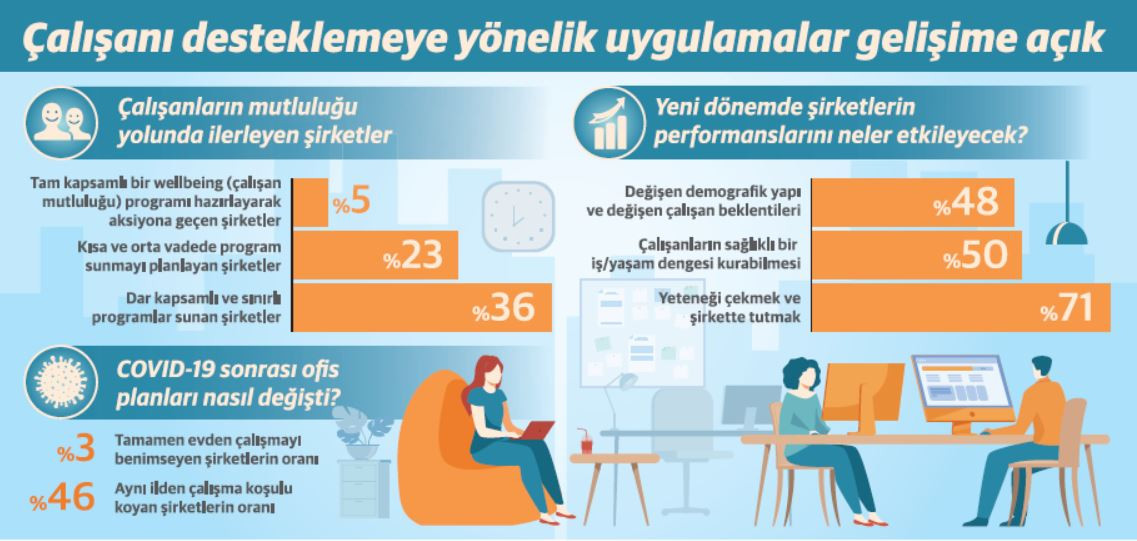Aon, which provides professional services on risk, retirement and health issues by making use of data and analysis, has prepared the “Wellbeing” prepared to analyze the existing fringe benefits structures of multinational and local companies operating in Turkey and the changes in these structures, to identify new practices and to examine the works of companies to support their employees. announced the results of the “Applications, Benefit Trends and Return to Office Survey”. A total of 94 institutions, consisting of 20 percent local and 80 percent global companies, operating in more than 16 sectors, from finance to health services, from manufacturing industry to consumer products, participated in the research.
Few companies fully embrace working from home
Within the scope of the research, companies that completed their plans to return to the office after COVID-19 were asked which application they determined for their new working order. 83% of the companies stated that they have made changes in their working patterns, but the rate of companies that have completely adopted working from home was limited to 3%.
46 percent of the companies set the condition of working from the same province, which shows that companies still value easy accessibility of their employees.
Support should be increased according to the changing working environment
The three items that they think will affect the company’s performance the most in the new period are: Attracting and retaining talent (71%), employees’ ability to establish a healthy work/life balance (50%), changing demographics and changing employee expectations (48%). Considering the changing working environment, companies think that they should support their employees, but the rate of companies that took action by preparing a full-fledged wellbeing program was limited to 5%. While the rate of companies offering narrow and limited programs was 36%, the rate of companies planning to offer programs in the short and medium term was 23%.
22% of companies plan to switch to flexible fringe benefits
The companies listed their priorities for starting their wellbeing plans as follows: Increasing employee satisfaction and loyalty (87%), increasing employee productivity (74%), improving work-life balance (70%), reducing employee stress (57%), attracting and retaining talent (51%), supporting employee’s physical health (49%), increasing company job performance (36%), reducing employee turnover (25%), promoting job security (14%), social responsibility (12%) , increasing the resilience of the employee (8%), workforce planning (5%), reducing the health expenses and absenteeism rate (3%) took the last place. In this question, companies could choose more than one option. Although 80% of the companies do not have flexible fringe benefits, 22% of the companies stated that they plan to switch to flexible fringe benefits in the coming years.

COMPANIES REVIEW EMPLOYEE PACKAGES AND RIGHTS
Sinem Yalçın, Assistant General Manager for Health and Pension Solutions at Aon Turkey, evaluated the results of the research as follows: “In our study in 2020, we determined that the remote working method has become a rising trend. In this study, we see that companies have adopted the option of working remotely. Changing working conditions are leading companies to review the packages and benefits they offer to employees. As a result of these reviews, it is seen that the areas where companies take/plan to take action stand out as wellness and flexible fringe benefits practices. According to the survey results, although companies have started various programs to support employees under the heading of wellbeing, very few companies can do this systematically and measure performance and recycling. As a company, we provide consultancy services by using our global experience to meet the needs of our customers and to enable them to develop comprehensive programs.”
PRICE DIFFERENCE PRINCIPLES IN TCDD AUCTIONS ARE DETERMINED
● TCDD A.Ş. and TCDD General Directorate’s regulations regarding the provision of a price difference to contractors in the purchase of goods and services and the possibility of termination provided that they meet the conditions were published in the Official Gazette. Accordingly, price difference calculation will be made for the parts realized between January 1, 2022 and March 31, 2022, regardless of whether there is a price difference clause in the contract. As of April 15, 2022, contracts with a realization rate of up to 15 percent may also be terminated for contracts made in TL.
SECOND DEFERRED TO SCHOOL FOOD APPROVAL REQUIREMENT
● Products to be sold directly to students in school canteens. Agriculture and the obligation to obtain ‘school food’ approval from the Ministry of Forestry was postponed to 11 September 2023. With the Communiqué on School Food issued in 2020, it was obligatory to obtain school food approval for prepackaged foods that will be offered directly to students for sale or consumption in food establishments such as canteens, cafeterias, cafeterias, buffets, and tea shops. The mandate, which was originally supposed to take effect in September 2021, was first postponed to September 2022. With this change, the school food document requirement was postponed for 1 more year.
